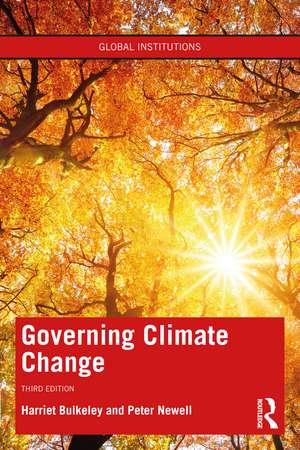Governing Climate Change: Global Institutions
Autor Harriet Bulkeley, Peter Newellen Limba Engleză Paperback – 5 mai 2023
The book:
- Evaluates the role of states and non-state actors in governing climate change at multiple levels of political organization: local, national, and global
- Provides a discussion of theoretical debates on climate change governance, moving beyond analytical approaches focused solely on nation-states and international negotiations
- Examines a range of key topical issues in the politics of climate change
- Includes multiple examples from both the north and the global south
| Toate formatele și edițiile | Preț | Express |
|---|---|---|
| Paperback (1) | 287.70 lei 3-5 săpt. | +18.67 lei 4-10 zile |
| Taylor & Francis – 5 mai 2023 | 287.70 lei 3-5 săpt. | +18.67 lei 4-10 zile |
| Hardback (1) | 886.74 lei 6-8 săpt. | |
| Taylor & Francis – 5 mai 2023 | 886.74 lei 6-8 săpt. |
Din seria Global Institutions
-
 Preț: 329.60 lei
Preț: 329.60 lei -
 Preț: 303.16 lei
Preț: 303.16 lei -
 Preț: 279.80 lei
Preț: 279.80 lei -
 Preț: 279.88 lei
Preț: 279.88 lei -
 Preț: 309.04 lei
Preț: 309.04 lei -
 Preț: 326.01 lei
Preț: 326.01 lei -
 Preț: 263.85 lei
Preț: 263.85 lei -
 Preț: 310.65 lei
Preț: 310.65 lei -
 Preț: 302.68 lei
Preț: 302.68 lei -
 Preț: 295.35 lei
Preț: 295.35 lei -
 Preț: 357.44 lei
Preț: 357.44 lei -
 Preț: 299.26 lei
Preț: 299.26 lei -
 Preț: 326.36 lei
Preț: 326.36 lei -
 Preț: 341.32 lei
Preț: 341.32 lei -
 Preț: 188.79 lei
Preț: 188.79 lei -
 Preț: 345.89 lei
Preț: 345.89 lei -
 Preț: 363.25 lei
Preț: 363.25 lei -
 Preț: 363.41 lei
Preț: 363.41 lei - 18%
 Preț: 1001.55 lei
Preț: 1001.55 lei - 26%
 Preț: 761.76 lei
Preț: 761.76 lei - 18%
 Preț: 999.82 lei
Preț: 999.82 lei -
 Preț: 449.30 lei
Preț: 449.30 lei -
 Preț: 384.16 lei
Preț: 384.16 lei -
 Preț: 440.69 lei
Preț: 440.69 lei -
 Preț: 369.18 lei
Preț: 369.18 lei -
 Preț: 368.90 lei
Preț: 368.90 lei -
 Preț: 345.89 lei
Preț: 345.89 lei -
 Preț: 360.10 lei
Preț: 360.10 lei - 18%
 Preț: 998.71 lei
Preț: 998.71 lei - 18%
 Preț: 1113.25 lei
Preț: 1113.25 lei -
 Preț: 358.84 lei
Preț: 358.84 lei - 17%
 Preț: 246.93 lei
Preț: 246.93 lei - 18%
 Preț: 1160.47 lei
Preț: 1160.47 lei - 18%
 Preț: 1052.38 lei
Preț: 1052.38 lei -
 Preț: 381.03 lei
Preț: 381.03 lei -
 Preț: 364.51 lei
Preț: 364.51 lei - 26%
 Preț: 819.48 lei
Preț: 819.48 lei - 18%
 Preț: 1111.51 lei
Preț: 1111.51 lei - 18%
 Preț: 999.46 lei
Preț: 999.46 lei
Preț: 287.70 lei
Nou
Puncte Express: 432
Preț estimativ în valută:
55.06€ • 56.88$ • 45.82£
55.06€ • 56.88$ • 45.82£
Carte disponibilă
Livrare economică 04-18 martie
Livrare express 15-21 februarie pentru 28.66 lei
Preluare comenzi: 021 569.72.76
Specificații
ISBN-13: 9781032114194
ISBN-10: 1032114193
Pagini: 190
Ilustrații: 1 Tables, black and white; 4 Line drawings, black and white; 1 Halftones, black and white; 5 Illustrations, black and white
Dimensiuni: 138 x 216 x 15 mm
Greutate: 0.23 kg
Ediția:3 ed
Editura: Taylor & Francis
Colecția Routledge
Seria Global Institutions
Locul publicării:Oxford, United Kingdom
ISBN-10: 1032114193
Pagini: 190
Ilustrații: 1 Tables, black and white; 4 Line drawings, black and white; 1 Halftones, black and white; 5 Illustrations, black and white
Dimensiuni: 138 x 216 x 15 mm
Greutate: 0.23 kg
Ediția:3 ed
Editura: Taylor & Francis
Colecția Routledge
Seria Global Institutions
Locul publicării:Oxford, United Kingdom
Public țintă
Postgraduate and UndergraduateCuprins
Introduction: Governing Climate Change 1.Governing Climate Change: a brief history 2.Governance for whom?Equity, justice, and the politics of sustainable development 3.Between global and local: Governing climate change transnationally 4.Community and the governing of climate change 5.The private governance of climate change 6.Conclusions
Notă biografică
Peter Newell is Professor of International Relations and research director and co-founder of the Rapid Transition Alliance. His research explores the political economy of low carbon energy transitions. He is author of Climate for Change (CUP, 2000), Power Shift (CUP, 2021) and co-author (with Matthew Paterson) of Climate Capitalism (CUP, 2010) Transnational Climate Change Governance (with Harriet Bulkeley et al) (CUP, 2014) and Changing Our Ways (with Freddie Daley and Michelle Twena) (CUP, 2022)
Harriet Bulkeley is Professor at the Department of Geography at Durham University. Her research interests are in the nature and politics of environmental governance with a focus on climate change and urban sustainability. She is co-author (with Vanesa Castan Broto and Gareth Edwards) of Urban Politics and Climate Change (Routledge, 2014) and Transnational Climate Change Governance (CUP, 2014), and co-editor (with Johannes Stripple) of Governing the Climate (CUP, 2014).
Harriet Bulkeley is Professor at the Department of Geography at Durham University. Her research interests are in the nature and politics of environmental governance with a focus on climate change and urban sustainability. She is co-author (with Vanesa Castan Broto and Gareth Edwards) of Urban Politics and Climate Change (Routledge, 2014) and Transnational Climate Change Governance (CUP, 2014), and co-editor (with Johannes Stripple) of Governing the Climate (CUP, 2014).
Descriere
This fully revised and expanded new edition provides a short and accessible introduction to how climate change is governed by an increasingly diverse range of actors, from civil society and business actors to multilateral development banks, donors, and cities.
